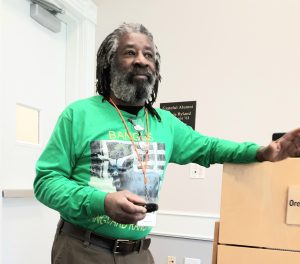
Renard Turner and his wife Chinette founded the Vanguard Ranch Natural Gourmet in Gordonsville, Virginia, 25 years ago, and through creative entrepreneurship and wise land management and animal husbandry practices they have built a value-added business model that works on a relatively small scale.
Their ideas about sustainability and regeneration on a global scale inform their daily practices. And they are encouraging African American people of the next generation to think about leaving the big cities and buy land for farming and homesteading.
1’59 goat is the number one red meat in the world
2’37 taking Future Farmers program in high school
3’11 went “back to the land” in the 1970s
3’50 goats have low carbon footprint
4’33 what is sustainability in the big picture and on the Vanguard farm
6’05 staying at a small scale and choosing not to grow into a big business
7’44 the market for goat meat is far bigger than “ethnic” communities
8’37 choosing to be a value-added producer and retailing directly
9’48 customers for the meat—state fairs, colleges, festivals, and other events
11’07 labor intensive, but the rewards are greater and there’s more control
11’54 first time goat meat eaters
12’37 the idea of “ethnic” food often points to a limited world view
13’22 the African diaspora is all goat eaters
13’33 BANGUS brand: Best All Natural Goat in the United States
14’18 strong and resilient goats
16’15 raising animals in a completely natural setting and mimicking nature as muc has possible
17’16 how they cull the herd
18’57 choosing not to fully maximize in order to stay in balance
20’35 promoting locally based agriculture, the time is now
21’06 encouraging homesteading for African Americans
21’22 African American land ownership has actually declined over the last century
22’05 food deserts, food apartheid
22’49 the limits fo urban farming as a vision for young people
23’58 black net worth declining–the remedy is land ownership
24’58 Jillian Hishaw interview
25’43 the anti-agriculture “blacklash” in the context of the history of slavery
26’36 young African American people need more exposure to agriculture and the land outside of cities
27’59 CITY = Captives In Tiny Yards
29’00 the problem of access to capital
29’22 most black, indigenous, people of color don’t have access to capital—by design
30’38 there are alternatives within regenerative ag for people who want to start farming
31’30 dealing with outright racism while trying to buy a tractor
34’53 multiple products and income streams including goat meat, a squabbery (meat pigeons)
37’41 seasonality: you can’t produce the same food all year round if you’re doing regenerative ag
39’20 what Renard eats himself
41’11 self suffiency and at the same time planetary interconnection
43’42 providing an example for others to follow
45’04 need a renaissance where African Americans migrate from the cities back to rural areas



Subscribe:
Apple Podcasts
Spotify